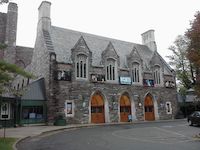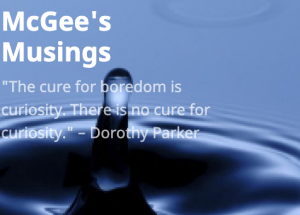My voice changed early. It dropped an octave or two long before any of my peers. When it was time to learn new hymns in chorus, the solution from the nuns was to tell me to be quiet. My takeaway was that I had no natural talent for singing. My voice was not worthy.
I pushed that interpretation a bit further, concluding that I was not to be heard in public. Quips and side commentary in class could be a fun game, but using my voice at volume was not.
Come high school I was pushed into situations where I was expected to speak up. Whatever natural reservations I might have had about public speaking were amplified by this history. Writing was fine, just don’t ask me to stand up and share.
Late in my high school career, I started into the science fair thing. The research and writing part was fun. Then I found out I was expected to talk about my work as well. Much less fun. Fortunately, my teachers and advisors were not interested in whether I was having fun. Nor did they consider public speaking to be a matter of talent but one of skill. And practice. So I practiced and I got feedback, Then I practiced some more and got still more feedback.
One of my classmates and I took the top two spots in the St. Louis region and traveled to Huntsville, Alabama to present our projects. More rehearsals. More feedback.
Repetition plus feedback builds competence.
Competence begets confidence.
Today we have the notions of fixed versus growth mindsets. Those didn’t exist in 1971. But Benedictine monks had their own notions of what young men should be able to achieve given motivation and feedback. Nor were they particularly interested in the opinions of the young men in their charge. Their expectations ruled, not yours.
Since those days, I’ve been on lots of stages and in front of many audiences. Life is more interesting if you subscribe to the notion that growth is possible. This is true whether it’s your own growth or that of others.
 My time learning to be a stage manager contained my first lessons in managing something bigger than myself. If there are 40 people you can see dancing on stage, there were at least as many behind the scenes making it happen. Everyone has a very specific set of tasks to perform, it all has to sync up moment to moment, and it all has to serve a singular artistic vision.
My time learning to be a stage manager contained my first lessons in managing something bigger than myself. If there are 40 people you can see dancing on stage, there were at least as many behind the scenes making it happen. Everyone has a very specific set of tasks to perform, it all has to sync up moment to moment, and it all has to serve a singular artistic vision. This experiment is now old enough to enlist. Pretty sure that wasn’t something I anticipated.
This experiment is now old enough to enlist. Pretty sure that wasn’t something I anticipated.